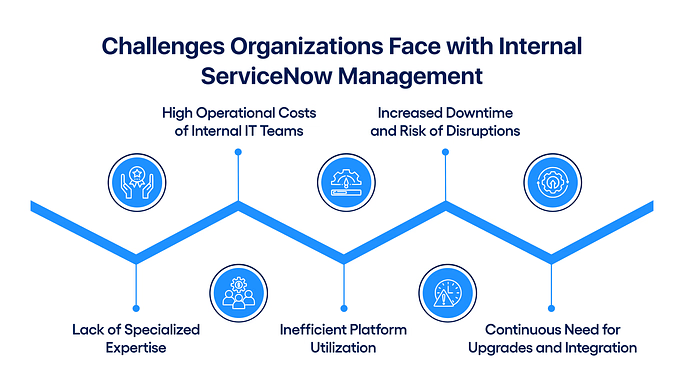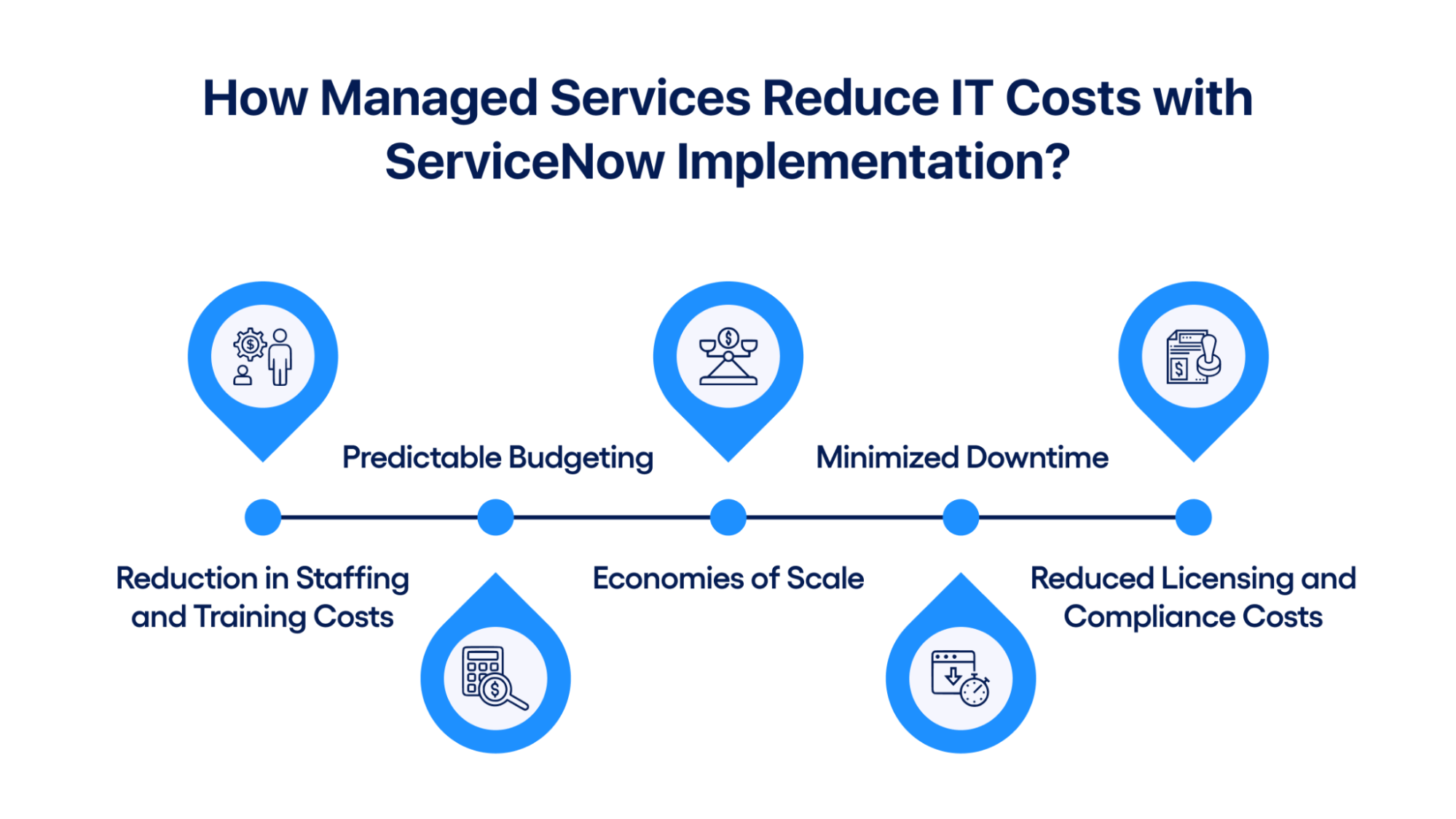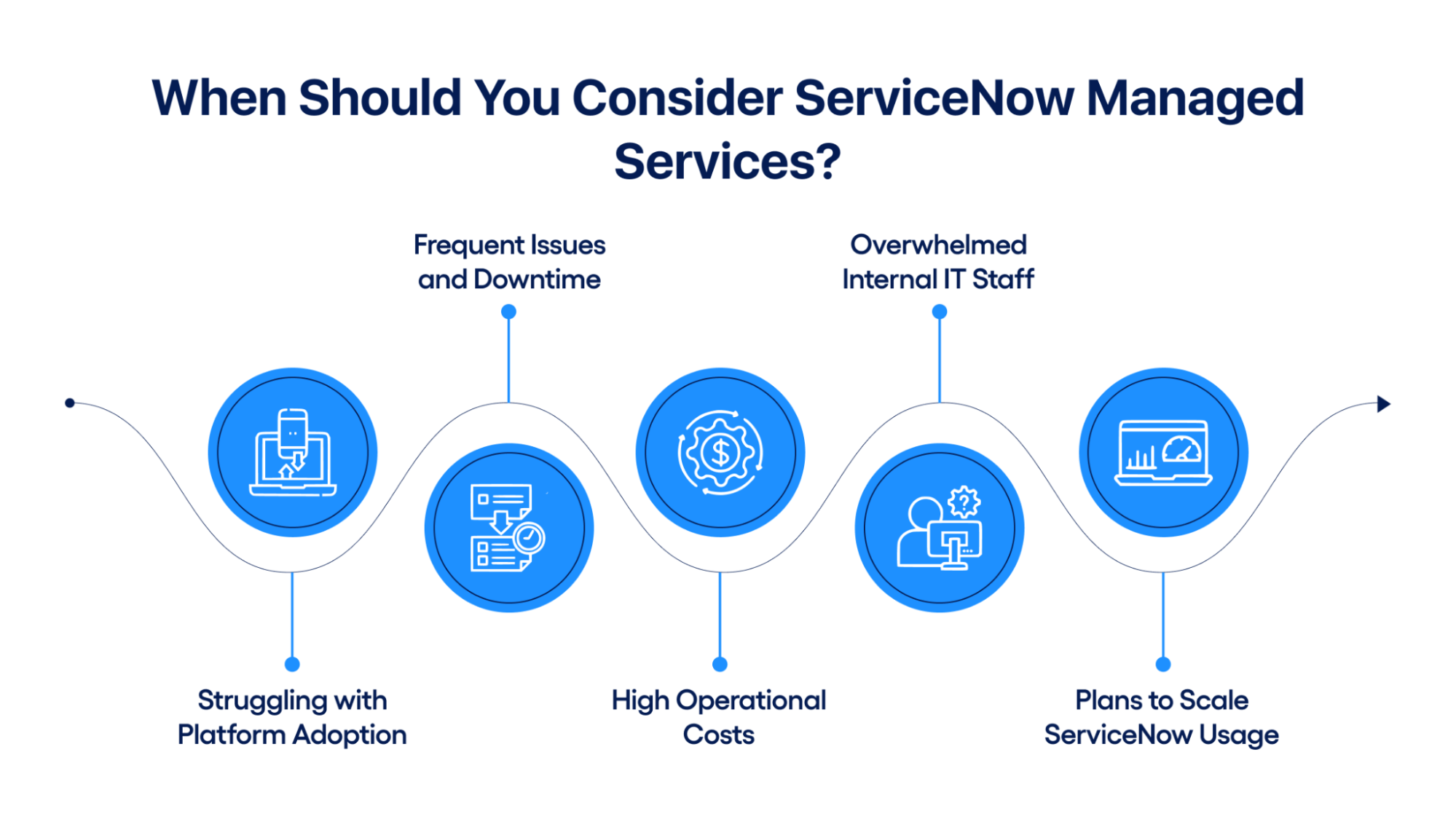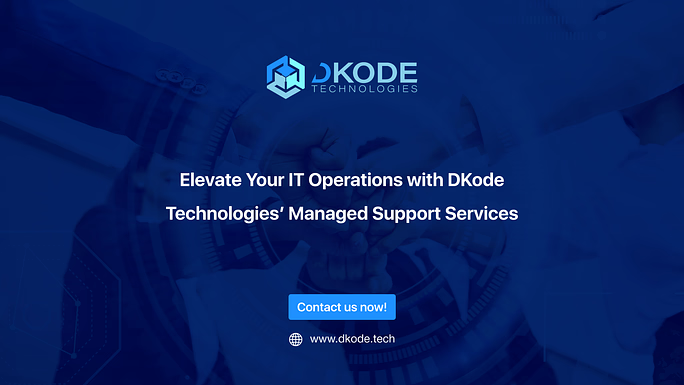Is your organization truly maximizing the value of your ServiceNow investment, or are hidden inefficiencies quietly draining your IT budget?
A recent Gartner study revealed that 70% of businesses face rising IT costs and performance gaps because they lack the time, resources, or expertise to manage growing digital platforms, such as ServiceNow, effectively. At the same time, IDC reports that organizations utilising managed IT services cut their operational costs by up to 30%, all while improving platform performance, security, and scalability.
ServiceNow is a powerful platform, but without continuous optimization, it often becomes underutilized and more challenging to manage over time. As organizations grow, so do their service delivery demands. Internal IT teams, already stretched thin, may struggle to keep up with upgrades, security patches, platform enhancements, and challenges related to user adoption. Over time, this leads to operational inefficiencies, rising costs, and missed opportunities for process improvements.
This is where ServiceNow Managed Services makes a measurable difference.
Managed services offer predictable cost structures, proactive system monitoring, faster incident resolution, and strategic guidance to align the platform with evolving business goals. By partnering with a specialized Managed Services Provider (MSP), organizations gain expert support to maintain, optimize, and expand their ServiceNow environment without overburdening internal teams.
In this blog, we’ll explore how ServiceNow Managed Services can reduce IT costs without sacrificing quality and optimize platform performance for tangible business results.
ServiceNow Managed Services: Scope and Capabilities
ServiceNow Managed Services (MS) refer to the ongoing management, support, and optimization of your ServiceNow platform by specialized external experts. These services handle daily operations, ensuring that your ServiceNow applications run efficiently, securely, and effectively. This allows your internal teams to focus on core, strategic business tasks.
ServiceNow itself is a cloud-based workflow automation platform that connects various business functions, ranging from IT and HR to customer service and security, streamlining and automating operations to enhance efficiency across the organization. Below is the list of services included in ServiceNow Managed Services:
Platform Administration
Platform administration involves daily oversight and maintenance of your ServiceNow environment. This includes user access management, configuration management, workflow adjustments, and continuous monitoring to ensure optimal system performance and security.
Continuous Development
Continuous development services cover ongoing enhancements to your ServiceNow instance. Providers regularly deliver improvements, build custom workflows, develop new functionalities, and implement integrations to adapt to evolving business needs, ensuring your platform continually aligns with industry best practices.
Incident Management
Incident management ensures quick identification, diagnosis, and resolution of issues impacting your ServiceNow environment. Managed service providers offer structured processes for incident tracking, response coordination, and resolution, which minimize disruptions and downtime for end users.
Upgrades and Patching
Managed service providers handle regular upgrades and apply necessary patches to your ServiceNow platform. This includes evaluating update compatibility, managing risks, performing system testing, and ensuring compliance with ServiceNow’s recommended update cycles to maintain optimal platform performance and security.
Reporting and Analytics Support
Reporting and analytics support involves creating, managing, and optimizing reports and dashboards tailored to your organizational needs. Providers deliver insights on platform usage, performance metrics, and operational trends, enabling informed, data-driven decisions to improve overall efficiency and service delivery.
Strategic Advisory Services
Strategic advisory services offer expert guidance on utilizing ServiceNow to achieve broader business objectives. Providers assist with strategic planning, future-proofing your platform, aligning ServiceNow capabilities with business goals, and developing clear roadmaps to ensure sustainable growth and maximized ROI.
Challenges Organizations Face with Internal ServiceNow Management

Below is a list of the challenges your organization may encounter when managing the ServiceNow platform internally:
Lack of Specialized Expertise
Managing ServiceNow internally requires specific skills and experience. Without a dedicated team or trained experts, your organization may struggle to handle complex configurations or troubleshoot effectively. This lack of expertise can slow down workflows and limit the platform’s full potential.
High Operational Costs of Internal IT Teams
Building and maintaining an in-house ServiceNow team involves significant costs, including hiring, training, and ongoing payroll expenses. Your organization may find these expenses challenging, especially when expertise in ServiceNow commands higher salaries and specialized resources.
Inefficient Platform Utilization
If your team lacks comprehensive knowledge of ServiceNow, you risk underutilizing the platform or misconfiguring critical functionalities. Improper setup can lead to inefficiencies, lower productivity, and suboptimal returns on your organization’s investment.
Increased Downtime and Risk of Disruptions
Without proactive management, your ServiceNow platform may experience increased downtime or frequent disruptions. Such outages negatively impact business continuity, reduce employee productivity, and could diminish overall user satisfaction within your organization.
Continuous Need for Upgrades and Integration
ServiceNow frequently releases updates and new features to enhance security, compliance, and functionality. Managing these updates internally requires a significant amount of resources and detailed planning. Additionally, integrating ServiceNow with other business systems often involves complexities that your internal team may find challenging to navigate effectively.
To learn more about building a solid ITSM foundation, explore our blog on CMDB vs. Asset Management: Which is Right for Your ITSM Strategy.
How Managed Services Reduce IT Costs with ServiceNow Implementation?

Managing ServiceNow internally can quickly drive up IT expenses if not handled efficiently. Here’s a breakdown of how partnering with a managed service provider directly lowers the costs involved in a ServiceNow environment.
Reduction in Staffing and Training Costs
Hiring full-time ServiceNow specialists is expensive. Salaries, benefits, and retention costs for certified professionals add up fast. Managed services remove the need for in-house staffing, giving you access to a team of experts without the ongoing payroll burden.
Additionally, since platform maintenance and enhancements are outsourced, there’s no need to invest heavily in ongoing employee training or certifications. This leads to substantial savings year-over-year.
Predictable Budgeting
Managed services operate on fixed monthly or annual contracts. This pricing model removes the uncertainty associated with project-based billing or emergency incident costs. Businesses can forecast IT expenditures more accurately and allocate resources more efficiently. Predictable billing ensures that there are no financial surprises, helping organizations stay within their budgets.
Economies of Scale
Service providers manage multiple clients using a common infrastructure and team expertise. This shared model spreads costs across customers, allowing each client to benefit from lower service rates compared to managing everything independently. Companies tap into advanced skills, proven tools, and scalable solutions without bearing the full cost of building these capabilities in-house.
Minimized Downtime
Unplanned downtime disrupts business operations and leads to productivity losses. Managed services use proactive monitoring, routine maintenance, and rapid incident response to catch and fix issues before they escalate. Fewer outages mean fewer hidden costs, including lost work hours, missed service-level agreements (SLAs), and customer dissatisfaction.
Reduced Licensing and Compliance Costs
ServiceNow licensing is complex and expensive if not managed properly. Managed service providers continuously assess your license usage to ensure you’re only paying for what you need. They also help maintain compliance with ServiceNow standards and regulatory requirements, reducing the risk of fines or penalties. This license optimization can result in savings of up to 20%, according to Forrester research.
Managed services ensure that ServiceNow runs efficiently, stays up to date, and aligns closely with changing business needs. Here’s how they drive optimization.
Driving ServiceNow Optimization: The Role of Managed Services
Maximizing the potential of ServiceNow requires more than basic maintenance. ServiceNow Why Settle for Anything Less? brief highlights the importance of utilizing the platforms full range of functionalities to achieve significant returns on investment.
Managed services ensure that ServiceNow runs efficiently, stays up to date, and aligns closely with changing business needs. Here’s how they drive optimization.
Enhanced Efficiency and Platform Utilization
Managed service providers implement best practices across platform deployment and configuration. By ensuring modules are set up correctly and customized where necessary, they help organizations use ServiceNow’s full capabilities. A Forrester study found that companies engaging with managed services improve platform utilization by 25% compared to those managing ServiceNow internally.
Proactive Issue Resolution
Instead of waiting for problems to surface, managed services continuously monitor system health. They use automated tools and human oversight to detect and address issues early, often before users are aware of them. Proactive maintenance reduces incident volumes by up to 40%, improving user satisfaction and avoiding operational disruptions.
Customized Implementation and Scalability
Managed services provide flexible implementation strategies, allowing adjustments to workflows, scaling modules, and adding new functionality as needed, without starting from scratch.
IDC research shows that companies utilizing integrated digital platforms and adaptable processes perform significantly better on key business indicators compared to their less agile counterparts.
Regular Upgrades and Feature Updates
ServiceNow releases two major platform updates each year. Without managed services, organizations often delay upgrades, which can lead to security gaps and missed innovation opportunities. Managed services handle upgrade cycles smoothly, testing and deploying changes with minimal disruption.
Improved Security and Risk Management
Security breaches are costly, with IBM reporting the average breach cost at $4.88 million in 2024. Managed services enhance ServiceNow security by applying patches promptly, continuously monitoring for vulnerabilities, and ensuring compliance with regulatory frameworks.
Organizations using managed services reduce their security incident rates by up to 35%, according to a Ponemon Institute report, which significantly strengthens their overall risk posture.
When Should You Consider ServiceNow Managed Services?

Choosing to work with a ServiceNow Managed Services Provider is a strategic decision that can help organizations maintain performance, lower costs, and plan. Here are a few signs that indicate it might be time to consider managed services for your ServiceNow environment:
1. Struggling with Platform Adoption
If your organization is not using ServiceNow to its full potential, it’s a strong indicator that expert help is needed. Many businesses invest heavily in the platform but fail to configure, integrate, or customize it properly. A Managed Services Provider ensures that the platform is aligned with your business processes, helping drive user adoption and maximize return on investment.
2. Frequent Issues and Downtime
Recurring technical problems, outages, or slow performance can disrupt daily operations and negatively impact the user experience. If your internal team spends more time reacting to issues than preventing them, a managed services provider can help.
They offer proactive monitoring, incident management, and performance optimization to reduce downtime and keep critical services running smoothly.
3. High Operational Costs
Managing ServiceNow internally often requires hiring specialized staff, investing in continuous training, and maintaining updated infrastructure. If operational costs are growing without delivering proportional value, managed services can provide a more cost-effective solution.
With predictable pricing models and shared resources, businesses can reduce overhead while still maintaining high-quality platform management.
4. Overwhelmed Internal IT Staff
Internal IT teams are often stretched thin across multiple responsibilities. When ServiceNow management becomes just one more task among many, it’s difficult to dedicate the attention and expertise the platform requires.
A managed services partner takes over day-to-day platform operations, allowing your IT team to focus on higher-priority strategic initiatives.
5. Plans to Scale ServiceNow Usage
As your organization grows, so do the demands on your ServiceNow environment. Expanding into new modules, such as HR Service Delivery, Customer Service Management, or IT Operations Management, requires careful planning, integration, and support.
Managed services provide the scalability and expertise needed to expand your ServiceNow capabilities efficiently without straining internal resources.
Benefits of Partnering with DKode Technologies for ServiceNow Managed Services

Maximizing the value of ServiceNow requires more than just launching the platform; it also involves continuous management, optimization, and adaptation to changing business needs. DKode Technologies offers a complete suite of ServiceNow Managed Services to help your organization streamline operations, control IT costs, and reduce operational risks. Here is how your organization can benefit from ServiceNow Managed Services:
1. Cost Management
One of the primary advantages of managed services is predictable and manageable costs. Instead of bearing the fluctuating expenses of staffing, training, equipment, and upgrades, companies pay a fixed monthly or annual rate.
This model allows for more accurate budget forecasting and financial planning. Additionally, services can easily scale up or down depending on business needs, providing financial flexibility without sacrificing performance or coverage.
2. Strengthened Risk Defenses
IT environments naturally carry risks from system failures to compliance breaches. Managed Services Providers (MSPs) help reduce these risks by implementing structured processes, continuous monitoring, and proactive security management.
They also bring specialized industry knowledge and proven best practices, ensuring service delivery remains consistent, compliant, and secure. By utilizing these capabilities, businesses can significantly lower the chances of unexpected service disruptions or regulatory penalties.
3. Higher Accountability and Uptime Performance
Continuous service availability is critical to maintaining business momentum. Managed services focus on minimizing downtime by proactively managing incidents, overseeing application performance, and integrating all components of the IT environment.
By ensuring all systems function seamlessly, organizations benefit from increased productivity and operational stability. Reduced outages protect internal operations and help maintain trust with customers and stakeholders.
4. Sustainable and Future-Ready IT Ecosystem
Technology changes rapidly, and keeping internal teams trained and infrastructure up to date can be costly and time-consuming. Managed service providers stay up to date with the latest ServiceNow updates, security protocols, and technology trends.
By embedding continuous improvement and innovation into service delivery, they help organizations stay ahead of industry shifts without major disruptions or additional strain on resources. Locking in multi-year service contracts also provides stability in pricing and support levels, further reducing financial and operational risks.
Elevate Your IT Operations with DKode Technologies’ Managed Support Services

At DKode Technologies, we help organizations structure, scale, and streamline service delivery using the ServiceNow platform. But our work extends beyond support; we connect internal workflows with external demands to deliver measurable outcomes across teams.
Our certified ServiceNow professionals and ITIL Practitioners bring deep industry expertise and a proven ability to solve complex challenges. What sets us apart is our technical expertise and a strong, collaborative team culture built on trust, shared learning, and a commitment to excellence.
We support organizations across multiple service areas:
- Enterprise IT Solutions – End-to-end IT services including ITSM, ITAM, CMDB, and Security Operations tailored for enterprise efficiency and resilience.
- Software Development Solutions – Custom software solutions built to meet unique business needs with speed, flexibility, and scalability.
- Managed Support Services – Reliable, ongoing technical support to maintain system stability and ensure optimal performance
- Customer and Industry Solutions – Tailored ServiceNow CSM solutions to enhance customer experiences
- Asset Management – that offers complete visibility into hardware, software, and services—enabling accurate tracking, better control, and more efficient planning.
- IT Operations Management (ITOM) – to monitor systems, prevent disruptions, and ensure consistent performance across environments
By combining ITSM, CSM, and ITOM, we help businesses move faster, work smarter, and scale confidently, backed by a team as invested in your success.
Contact Us